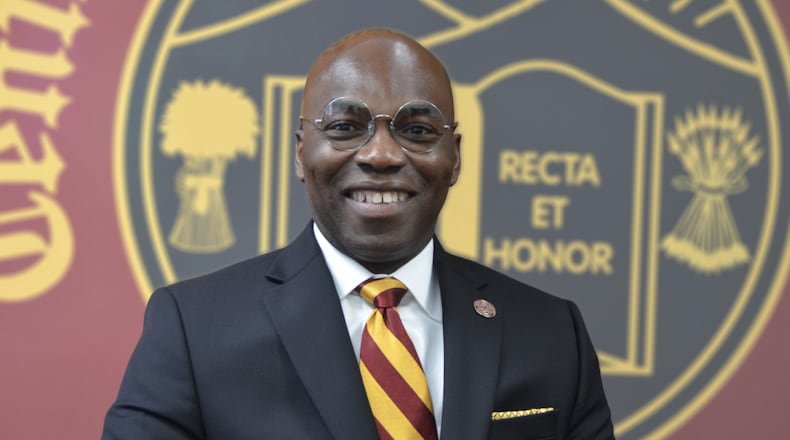Dr. Morakinyo A.O. Kuti: A visionary leader
Kuti’s journey to the presidency has been marked by diverse experiences and a deep commitment to education. From his early days in Nigeria to becoming an esteemed alum of CSU in 1985, Kuti’s path uniquely prepared him for his role as the University’s 10th president. With a Bachelor of Science from CSU, an MBA from St. Thomas University and a Ph.D. in Public Policy and Administration from Walden University, Kuti brings a wealth of knowledge and a clear vision for the future.
Kuti emphasizes leveraging research to tackle pressing societal issues, empowering researchers, faculty and staff to drive innovation. His leadership aims to expand CSU’s research capabilities and launch new programs addressing disparities in healthcare and other critical areas.
“Our goal is to improve the quality of our student experience and their academic outcomes,” Kuti states, highlighting his commitment to enhancing educational opportunities and fostering a supportive environment for all students.
The merger of COE and CHAS: Forming CHASE
Effective July 1, CSU announced the merger of its COE and CHAS to form the new College of Humanities, Arts, Social Sciences, and Education (CHASE). Dr. Lillian Drakeford, former interim dean of COE, now serves as interim dean of CHASE, while Dr. Amy Hobbs-Harris, former dean of CHAS, steps into the role of interim provost and vice president of Academic Affairs. Dr. Anne-Marie Walkowicz has been named associate dean for the new college.
The merger aims to enhance operational efficiency, optimize resources and foster a more enriched educational experience for students and faculty.
“We aim to create a more cohesive academic environment that supports interdisciplinary collaboration and expands opportunities for both learning and research,” Drakeford said.
This consolidation aligns with CSU’s goals of increasing enrollment, improving retention rates and ensuring student success through innovative educational initiatives.
Navigating accreditation: Ensuring excellence
Accreditation plays a pivotal role at CSU, signifying the University’s dedication to upholding the highest standards and ensuring the excellence of its academic programs. Central State maintains accreditation from the Higher Learning Commission through 2033, along with various specialized accreditations across its academic disciplines. These include the Accreditation Council for Business Schools and Programs (ACBSP) for business, the Accreditation Board for Engineering and Technology (ABET) for engineering, and the Council for Accreditation of Educator Preparation (CAEP) for education, among others.
Margery Coulson-Clark, Ph.D., former vice provost for Teaching, Learning, and Program Development, oversees the university’s accreditation processes, ensuring compliance and fostering continuous improvement. Accreditation is crucial for maintaining federal funding, including Pell Grants, which are vital for approximately 90% of CSU students.
“Accreditation ensures Central State meets minimum standards of excellence, assuring students that their degrees adhere to national benchmarks,” Coulson-Clark emphasized.
Strategic planning and community engagement
Kuti’s strategic plan for Central State focuses on enhancing the student experience, fostering academic excellence and ensuring long-term sustainability. The implementation of guided pathways aims to support student success from enrollment to graduation, reflecting Kuti’s belief in creating a supportive educational environment.
Central State’s commitment to community engagement is evident through its Extension agents in 42 of 88 Ohio counties, addressing critical issues from agriculture to economic development. The university’s regional presence is further strengthened by collaborations with organizations such as the Dayton Development Coalition and the Miami Valley Regional Planning Commission.
“As a Land-Grant University, we’re compelled to improve the lives of individuals in our communities by using the knowledge we’ve created through research,” Kuti said.

